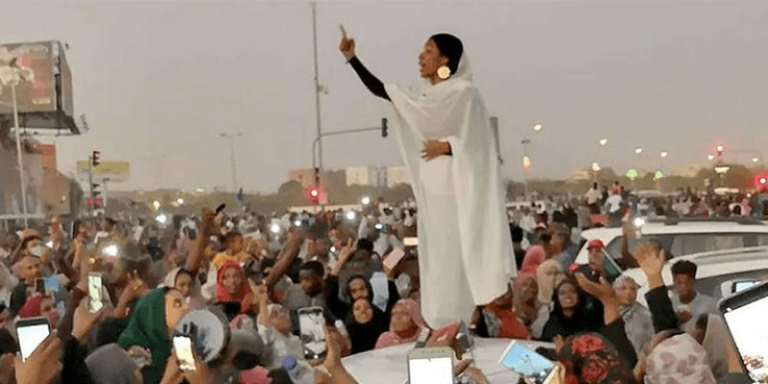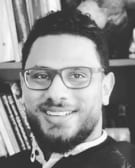
After 30 years of Omar al-Bashir’s dictatorship and tyranny, the burden of regime change is heavy for the Sudanese people to bear. The political scene is a lot more complicated than observers might think. Bashir was ousted by a military coup; however, his regime continues in a different form as a result of a desperate attempt by its remnants to reproduce itself and ensure continuity. Millennials were at the heart of this change and continue to be; and young women, in particular, have led many of the protests in the streets at a point when older generations appear to have lost hope that change is possible in their lifetimes.
What are the possible political scenarios in the aftermath of Bashir’s removal? How can the Sudanese achieve the goals they set out for themselves, especially the goal of living in a democratic and inclusive Sudan? To answer these questions, it is necessary to appreciate the forces driving political change in today’s Sudan and their interplay with competition and cooperation in shaping the country’s future. These forces revolve around the revolutionaries and protesters in the streets, the political opposition and military council, and the international and regional stakeholders.
Sudan’s Revolutionary Youth
The main driving force in Sudan’s revolution is the youth, and in particular the millennials. Since December 2018, the protests were mainly led by the Sudanese Professionals Association (SPA) and the Alliance for Freedom and Change (AFC). However, youth and millennials have contributed significantly toward the success of the sit-ins that led to the downfall of Bashir. This is when Lieutenant General Awad Ibn Auf, then-defense minister and former head of the Sudan Armed Forces, delivered the news that the military had deposed the president and a transitional military council (TMC) would administer the affairs of the country. Amid a wave of mass protests, the same youth and millennials immediately forced Ibn Auf, the head of the TMC, to step down a day after leading the coup. Protesters led by leaders of the SPA and AFC made it clear that no one should leave the streets until the military hands over power to a civilian government.
It is important to note that a large segment of youth protesters is not affiliated with any known political groups and some of them are not even interested in politics. What made them part of these protests, though, whether in their neighborhoods (when forming small groups chanting in the evenings), schools and universities, and streets, was one factor only: their belief that the Sudanese deserve a better future and need to own their destiny. The youth protesters also believe that for this future to be bright, freedom is a right and not a privilege and there can be justice only when there is equality. Youth trusted the SPA to lead and organize processions and protests even though the association’s leaders were unknown; in fact, their names remained undisclosed until the day the military announced that Bashir had been removed from power.
The youth often wait patiently for announcements by the SPA to tell them what they should do next and when and where. The crisis for this protesting generation is one about trust and loss of confidence in politics; this generation lacks faith in the credibility of the political parties to lead people and doubts their ability to challenge Bashir’s repressive regime. The SPA has been adept at mobilizing the youth, increased the level of their political awareness, and eventually established trust and restored confidence. Any negotiations to hand over power to civilians between the SPA and AFC, on the one hand, and the TMC, on the other, will have to involve the youth—not only in negotiating the terms of the proposed civil government, but also in taking a leading role in both the transitional council and the government.
The Political Opposition
The second most important driving force are the SPA and AFC. The SPA came into existence in October 2016 when three of Sudan’s largest professional associations joined forces and formed an alliance charter that initially included doctors, journalists, and lawyers and later was joined by a large number of professional bodies and associations.
The signatories to the AFC coalition of opposition parties are the major force behind Sudan’s mass protests. It includes not only political parties but also civil society organizations, youth groups, and professional associations (including the SPA itself). The SPA and AFC are currently leading the negotiations with the TMC and may be more accurately characterized as the de facto political opposition on the ground. The initial demand of the SPA and AFC was the formation of a National Transitional Government to be composed of qualified individuals based on merit and good standing, and one that represents various Sudanese groups and receives the consensus of the majority. On April 18, a joint statement by the AFC on the formulation of a transitional civil government was released. The AFC, SPA, and other groups behind the protests said the new transitional government should be made up of a presidential council tasked with carrying out the functions of the state, a council of ministers, and a transitional civil legislative council. These forces explained that the framework for the structural functions of the Transitional Civil Authority was a product of an integrated vision developed in accordance with the Declaration of Freedom and Change.
At first glance, the opposition represented by the SPA and AFC appears to be unified, confident, and united behind a clear vision along with a comprehensive program for change. What remains unknown, though, is how to reach a consensus not merely on a theoretical level but, more importantly, on a practical level. How can the framework proposed by the opposition for the transitional period be transformed into a viable action plan to which the TMC can agree? For instance, who should be in the presidential council? Has the opposition prepared names already, and do these names meet everyone’s approval and expectation? These and other questions need to be answered before more pressure is put on the TMC.
Over the past 30 years, Sudanese politics has become bitterly polarized and the debate has always focused on the identity of the state. There has also been a divide over whether Sudan is a homogeneous country or a multiethnic and multi-religious country. The more time the opposition takes to formulate and develop a well-thought-out transitional plan and communicate it properly to the protesters in the streets, the harder it becomes for the latter to continue the sit-ins. The opposition would then lose its bargaining chip and the TMC would then come up with pretexts not to hand over power to a transitional civilian council. This, of course, assumes that the TMC is willing to consult and negotiate with the SPA and AFC only, and agrees to exclude everyone else.
On April 21, the opposition (represented by the SPA and AFC) was supposed to name members of a transitional authority to replace the TMC. Instead, the opposition said it was suspending negotiations with the TMC and called for escalating protests to keep up pressure on the ruling TMC. They argued that the TMC wishes to conduct more talks and consultations with political groups and parties which the SPA and AFC believe represent Bashir’s dissolved political party (i.e., the political figures and parties that have been part of Bashir’s government before his overthrow). After days of expectations, the failure of the SPA and AFC to unveil the names of the candidates for the proposed presidential council became a huge disappointment for the crowds gathering at the military headquarters, although it was hard to see how announcing the names per se would persuade the TMC to hand over power or what political purpose this move will serve. On the same day, Lieutenant General Abdel Fattah al-Burhan, who replaced Ibn Auf as TMC leader, told state TV that the TMC is committed to handing power to a civilian authority.
The TMC was clear that it would accept a civilian-led government with a prime minister to be named by the opposition. In fact, it has invited the protesters to agree on a civilian prime minister to form the government (but said it would keep the interior and defense ministries). The TMC has also made some concessions to protesters such as the removal of the country’s three highest-ranking public prosecutors, the chief justice, and the top-ranking generals in the National Intelligence and Security Service (NISS). It agreed to the appointment of a new intelligence chief. The TMC has also arrested several members of the former ruling party of ousted President Omar al-Bashir; along with the president, they are all now in prison—although this has not been confirmed by any independent source other than the TMC. These measures, however, are cosmetic and they do not change the fundamental nature of the regime.
The TMC’s series of crackdowns on officials from Bashir’s administration were intended to appease protesters who want the TMC to hand power to a civilian-dominated presidential council. The TMC does not seem to be willing to compromise in this way. During his interview with state TV, Lieutenant General Burhan said that the military council received more than one hundred proposals from different political parties and groups, which the TMC is currently considering. This is not promising, as Burhan was clear that all political parties will have to reach some consensus (which is something the SPA and AFC do not agree with as they think that only one party should be consulted—that is, those who led the revolution represented by the SPA and AFC). Be that as it may, there appears to be some softening of positions, as the military council announced on April 24 that three of its members––all enablers of Bashir––have resigned while the opposition agreed to resume negotiations on a transition agenda.
Regional and International Actors
On the regional front, the TMC has been given strong backing from Saudi Arabia and the United Arab Emirates, which included more than $3 billion in aid. The two countries have ties with Abdel Fattah al-Burhan and his deputy, Mohamed Hamdan Dagalo, through their participation in the Saudi-led coalition fighting in Yemen. Officials from Bahrain and Egypt have also visited Khartoum and conveyed a message of support from leaders of the two states. Likewise, African leaders meeting in Cairo agreed to give Sudan’s TMC more time to implement democratic reforms. The decision extends by up to three months a 15-day deadline initially set by the African Union for Sudan’s TMC to hand over power to civilians or to be suspended from the group.
Key regional players such as Saudi Arabia, the UAE, and Egypt will no doubt confer political legitimacy on the military council and cement its negotiating position at the expense of the opposition. Regional political and economic support is expected for security and political reasons. Sudan’s stability is a concern for everyone in the region. However, having a civilian government in Sudan may not be a priority for some Arab states, at least for the time being. It is noteworthy that US, UK, Dutch, and EU ambassadors have been meeting with the ruling military council to urge the swift formation of a transitional civilian government.
Regional and international stakeholders will continue to have widely diverging views regarding what the TMC should or should not do. For their part, the Sudanese should not lose their focus and must gear themselves up to continue their long walk to freedom. The TMC and the opposition may have unintentionally entered into a power struggle and lost sight of the fact that they should have similar goals. More often, the relationship between the military and civilians is conceived as a power struggle and a hierarchical ordering. The battle now is for the future of Sudan.

